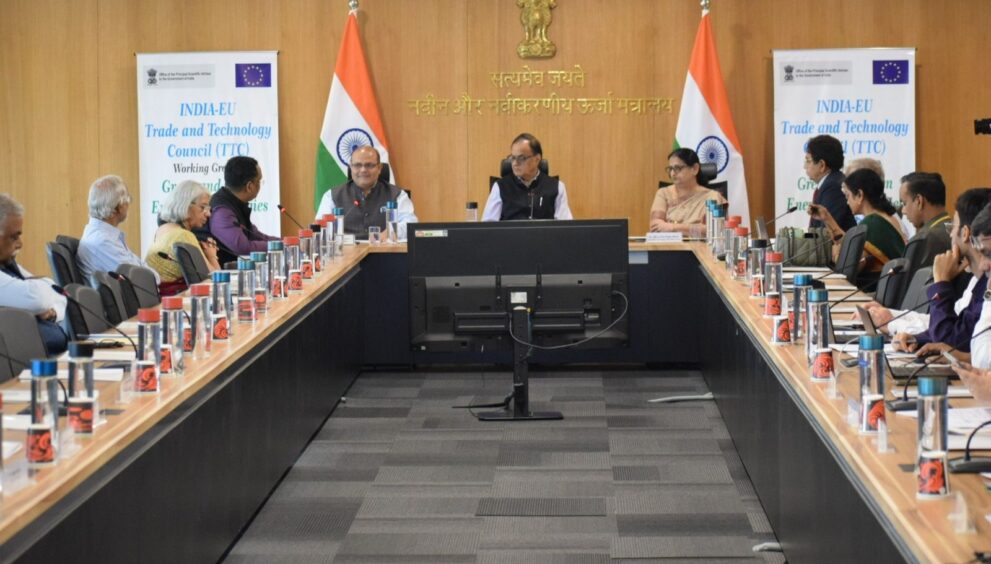India-EU Tech Council Hosts Global Workshop on Green Energy

Summary- India and Europe are engaged in strategic coordination and engagement on trade and technology. After a meeting to discuss bilateral collaboration between the President of the European Commission, Ursula von der Leyen, and the Hon. Prime Minister of India, Narendra Modi, on 25 April, 2022, it was publicly announced. There are three working groups that have been established inside the TTC
A two-day international workshop on “Green & Clean Energy Technologies” was organised by the Working Group 2 (WG2) of the India-European Union (EU) Trade & Technology Council (TTC) on 10 to 11 October, 2023. The workshop was hybrid-hosted by the Ministry of New and Renewable Energy (MNRE) and the Office of Principal Scientific Adviser to the Government of India.
India and Europe are engaged in strategic coordination and engagement on trade and technology. After a meeting to discuss bilateral collaboration between the President of the European Commission, Ursula von der Leyen, and the Hon. Prime Minister of India, Narendra Modi, on April 25, 2022, it was publicly announced. There are three working groups that have been established inside the TTC.
Ajay Kumar Sood, Principal Scientific Adviser (PSA) to the Government of India, and Marc Lemaître, Director-General, Directorate General for “Research and Innovation,” European Commission, Brussels, are the chairs of the Working Group 2 on Green & Clean Energy Technologies.
In his opening remarks during the workshop, he focused on the contribution of the India-EU TTC cooperation to advancing economic and technological linkages between India and Europe. He gave a summary of the workshop’s goals, which included exchanging knowledge about policy and regulatory frameworks, locating cutting-edge green technologies, identifying areas of collaboration that needed improvement, identifying opportunities for collaboration, encouraging co-development of technologies, and establishing institutional collaboration projects.
The workshop comprised of four insightful sessions:
Arun Tripathi, Advisor, MNRE, India, and Ms. Helene Chraye, Head of Unit, DG R&I Directorate C1 – Unit on Clean Energy Transition, EU, co-chaired the inaugural session, “Waste to Green Hydrogen.” During the event, several presentations on potential areas of EU and India cooperation were seen, including transport, safety standards, and regulatory framework. Waste to Green Hydrogen conversion technologies, solutions, and prospects were discussed.
Szilvia Nemeth, Deputy Head of Unit, Directorate B4 on Healthy Oceans and Seas, EU, and M.V. Ramana Murthy, Mission Director, Deep Ocean Mission, Ministry of Earth Sciences, India, co-chaired the second session, “Marine Plastic Litter and Wastewater.” The reduction of marine plastic pollution and wastewater treatment techniques to address the ocean plastic problem and urban water issues were explored.
Two separate sessions made up the third session. Philippe Froissard (DG R&I – Head of Unit, Directorate C2 on Future Urban & Mobility Systems) and Sudhendu Jyoti Sinha (Adviser, Infrastructure, Connectivity & E-mobility, NITI Aayog) co-chaired Session 3(a) on “E-mobility: Circulatory Aspects of Batteries.” The possibilities of the EV & battery recycling market as well as insights into battery circulatory considerations were given.
The possibility of co-developing charging infrastructure technologies between India and the EU was discussed during Session 3(b) on “Interoperability of Charging Infrastructure,” which was presided over by Ashok Rajput, Member (Power System), Central Electricity Authority (CEA), and co-chaired by Harald Scholz, Head of Mobility Lab in JRC-ISPRA. The seminar also looked at how the Joint Research Centre (JRC), an EU organisation, and the Automotive Research Association of India (ARAI) collaborate to apply standards, conduct testing, and optimise processes.
Key insights from Sessions I and III were presented by Parvinder Maini (Scientific Secretary, Office of Principal Scientific Adviser to Government of India), including R&D on lithium ion batteries and recycling technologies, formalisation of a uniform waste collection system, and creation of a business model for the entire value chain.
Key insights from Sessions II and IV were provided by Cristina Russo (Director, Global Approach & International Cooperation in R&I, EU). She emphasised the necessity for a coordinated approach to deal with plastic trash. She suggested creating standards for certain technology under each of the theme headings as the next phase.
Maini thanked the chairs, co-chairs, and rapporteurs of each session as she brought the workshop to a close. She also expressed her gratitude to the various ministries that contributed to the workshop’s success, including MNRE, the Ministry of External Affairs, the Ministry of Heavy Industries, the Ministry of Earth Sciences, BIS, the Department of Science and Technology, the Ministry of Housing and Urban Affairs, and the Ministry of Environment, Forest and Climate Change.






















































































































































































































































































































































































































































































































































































































































































































































































































































